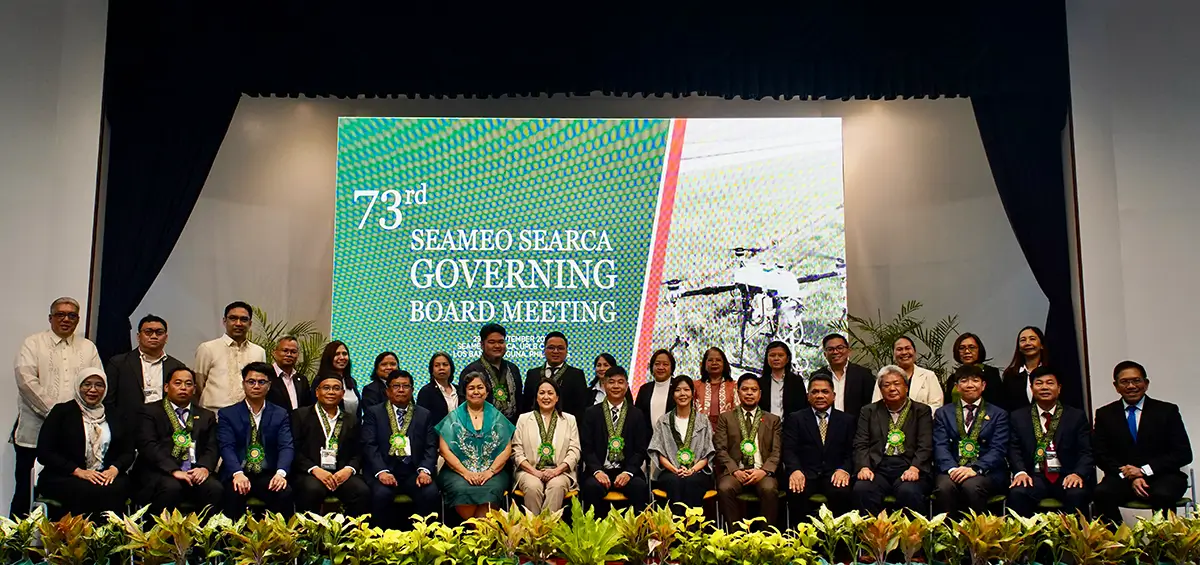LOS BAÑOS, Philippines—The Southeast Asian Regional Center for Graduate Study and Research in Agriculture (SEARCA) marked a pivotal moment in its institutional journey as it convened its 73rd Governing Board Meeting (GBM) on 29–30 September 2025 at its headquarters within the University of the Philippines Los Baños (UPLB) campus. The meeting culminated in the formal endorsement and support of SEARCA's updated 12th Five-Year Development Plan (FYDP), setting the strategic direction for the Center from FY 2025/2026 to FY 2029/2030.
The approved updated plan is themed Sustainable Transformation of Agricultural Systems through Innovation in Southeast Asia (SUSTAIN Southeast Asia) and signals a decisive shift from programmatic continuity to strategic acceleration. It further positions SEARCA as a regional catalyst for inclusive, climate-resilient, and innovation-led agricultural development—responding to urgent challenges such as food insecurity, rural poverty, and environmental degradation.
SEARCA Center Director Dr. Mercedita Sombilla, the first woman to lead the Center, presented the strategic agenda to the Governing Board, composed of representatives from the 11 SEAMEO Member Countries.
"This plan builds on past achievements with sharper thrusts—advancing evidence-based policy, education, and innovation to transform agriculture across Southeast Asia" Dr. Sombilla said, emphasizing SEARCA's role in bridging science and practice for the benefit of farming communities.
The Governing Board Meeting also reviewed SEARCA's performance for FY 2024/2025, with members offering strategic guidance on regional operations, financial stewardship, and program alignment.
Governing Board Chair Assoc. Prof. Huon Thavrak of Cambodia emphasized the urgency of the new agenda: "The foundation is strong. Now we must accelerate. The mission we are part of is urgent and necessary."
Board members in attendance included Dr. Suhaimi bin Haji Abdul Wahab of Brunei Darussalam, Dr. Inta Chanthavong of Lao People's Democratic Republic, YBhg Prof. Dr. Nazamid bin Saari of Malaysia, Dr. Ye Tint Tun of Myanmar, Dr. Jose Camacho, Jr. of the Philippines, Assoc. Prof. Dr. Chew Fook Tim of Singapore, Assoc. Prof. Dr. Narongrit Muangmai of Thailand, Assoc. Prof. Dr. Acácio Cardoso Amaral of Timor-Leste, and Assoc. Prof. Dr. Nguyen Hung Quang of Vietnam.
The meeting was also attended by key partners, including Assistant Secretary Cilette Liboro-Co of the Philippine Department of Education, who emphasized the transformative power of education in shaping agricultural futures.
"Education teaches you not just how to follow stories, but how to shape them. Not just to wait for good news but how to make it," she said.
Representatives from SEAMEO's Associate and Affiliate Members—including Southeast Asia One Health University Network (SEAOHUN), University of Tsukuba, and the Embassy of Morocco—joined virtually, affirming SEARCA's expanding network of collaboration. SEAMEO Deputy Director Pintip Iamnirath called on SEARCA to reaffirm its leadership in bridging research, reality, policy, and practice.
"If we align our collective expertise, we will begin to see the transformation we have long aspired—that is, farmers are thriving, not struggling, in an increasingly complex world," she said.
For his part, UPLB Chancellor Jose V. Camacho Jr., GB representative from the Philippines, expressed confidence in the Center's next chapter of leadership and impact. As SEARCA's host institution, UPLB continues to play a pivotal role in shaping the Center's progressive future.
The 12th FYDP is expected to deliver region-wide benefits for SEARCA's partners and clients—governments, universities, development agencies, and farming communities—by fostering research-to-policy innovation ecosystems, strengthening institutional capacities, and scaling transformative solutions across Southeast Asia.
The meeting concluded with a renewed commitment from the Governing Board to champion SEARCA's strategic directions and to support the Center in delivering on its vision: a Southeast Asia where agriculture is not only productive but sustainable, inclusive, and future-ready.
